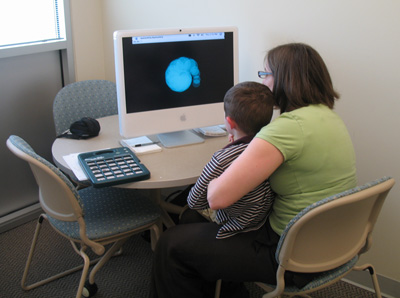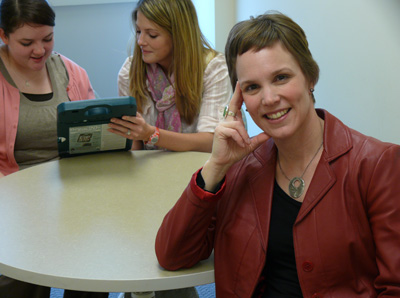

Treatment study focused on use of computer interaction to facilitate speech (left)
Professor DeThorne and two graduate students in Speech-language Pathology (right)
Professor DeThorne and two graduate students in Speech-language Pathology (right)
Archives
Archives of Discussion Group Meetings, Focal Point AY 2009-10
Fall 2009
8.28.09
Initial Large Discussion Group Meeting
Discussion Leaders: L. DeThorne & J. Hengst
Discussion Leaders: L. DeThorne & J. Hengst
After welcomes, introductions, and review of project objectives we decided to take turns leading discussions of key topics related to social interaction and communicative competence, with a focus on integrating research and clinical experiences. Emergent topics of interest included (a) principles of motor learning, (b) multi-modal communicative practices, (c) friendship, (d) community building, (e) web-based interfaces, and (f) evaluation of the evidence-based surrounding social integration practices.
9.11.09
Principles of Motor Learning
Discussion Leaders: L. DeThorne, J. Lohrens, C. Fahey, A. King, & J. Cravens
Discussion Leaders: L. DeThorne, J. Lohrens, C. Fahey, A. King, & J. Cravens
Readings:
Maas, E. et al. (20008). Principles of motor learning in treatment of motor speech disorders. AJSLP, 17, 277-298.
Ludlow, C.L. et al. (2008). Translating principles of neural plasticity into research on speech motor control recovery and rehabilitation. JSLHR, 51, S240-S258.
Fox, C.M. et al., (2006). The science and practice of LSVT/LOUD: Neural plasticity-principled approach to treating individuals with Parkinson Disease and other neurological disorders. Seminars in Speech and Language, 27, 283-299.
9.25.09
Sociocultural Theories of Communication
Discussion Leader: J. Hengst
Discussion Leader: J. Hengst
Readings:
Cole, M. & Engestrom, Y. (2007). Cultural-historical approaches to designing for development. In Ja Vasiner & Alberto Rosa (Eds.) The Cambridge Handbook of Sociocultural Psychology. Cambridge University Press.
Hengst, H.A. (2006). That mea::n dog: Linguistic mischief and verbal play as a communicative resource in aphasia. Aphasiology, 20, 312-326.
9.25.09
The Teen Connection Project: Focus on Evaluation of Social Skill Groups
Invited Speaker: Cheryl Light Shriner, PhD
Invited Speaker: Cheryl Light Shriner, PhD
Readings:
Lane, K.L, Menzies, H.M., Baron-Arwood, S., Doukas, G.L., & Munton, S.M. (2005).
Designing, implementing, and evaluating social skills interventions for elementary
students: Step-by-step procedures based on actual school-based investigations.
Preventing School Failure, 18-26.
Barry, T.D. Klinger, L.G., Lee, J.M., Palardy, N., Gilmore, T., & Bodin, S.D. (2003).
Examining the effectiveness of an outpatient clinic-based social skills group for high
functioning children with autism. J. of Autism an Developmental Disorders, 33, 685
701.
10.20.09
---
11.6.09
Web-based Interfaces for Facilitating Social Interaction in Individuals with ASD
Discussion Leader: Karrie Karahalios
Discussion Leader: Karrie Karahalios
Readings:
Putnam, C., & Chong, L. (2008). Software and technologies designed for people with autism: What do users want? ASSETS, ACM 978-1-59593-976-0/08/10.
Ohring, P. (2008). Web-based multi-player games to encourage flexibility and social interaction in high-functioning children with ASD. IDC. ACM 978-1059593-994-3.
Piper, A.M., O’Brien, E., Morris, M.R., & Winograd, T. (2006). SIDES: A cooperative tabletop computer game for social skills development. CSCW, ACM 1-59593-249-6/06/0011.
11.16.09
A Structured Approach to Teaching Communication: Teach Me Language
Invited Speaker: Christopher Flint, from Have Dreams, Chicago IL
Invited Speaker: Christopher Flint, from Have Dreams, Chicago IL
Christopher talked about, and showed video clips from, the teen social skills groups he runs through Have Dreams. The Have Dreams programs are based on Structured Teaching developed by Division TEACCH, at the University of North Carolina Chapel Hill, over 40 years ago.
11.20.09
---
12.4.09
Targeting multiple memory systems in clinical practice
Invited Speaker: Melissa Duff, PhD
Invited Speaker: Melissa Duff, PhD
Our guest speaker, Melissa Duff, is on faculty in Communication Sciences and Disorders at the University of Iowa. Melissa's research focuses on memory and it's role in social interaction and communication competence.
Readings:
Duff, M.C., Hengst, J.A., Tranel, D., & Cohen, N.J. (2006). Development of shared information in communication despite hippocampal amnesia. Nature Neuroscience, 9, 140-146. (Note, we watched a video clip from this data set in an earlier meeting.)
Hengst, J.A., Duff, M.C., & Dettmer, A. (in press). Rethinking repetition in therapy: Repeated engagement as the social ground of learning. Aphasiology.
Spring 2010
1.29.10
Update/Organization/Planning
Discussion Leaders: L. DeThorne & J. Hengst
Discussion Leaders: L. DeThorne & J. Hengst
2.12.10
Focus Group on the Salient Features of our Clinical Programs
Discussion Leader: Joshua Hailpern
Discussion Leader: Joshua Hailpern
2.26.10
Impact of ASD on Families
Discussion Leader: Aaron Ebata, Dept of Human & Community Development
Discussion Leader: Aaron Ebata, Dept of Human & Community Development
Readings:
Ebata, A., Meadan-Kaplansky, H., & Halle, J. (in press). Families with Children Who Have Autism Spectrum Disorders: Stress and Support. Exceptional Children.
Ebata, A.T., Chiao, J., Halle, J. & Tortorelli, L. (2009). Risk, Resilience, and Program Needs among Families of Children with Autism. Poster presented at the Annual Meeting of the National Council on Family Relations, San Francisco, CA, November 2009.
3.12.10
Cancelled
4.9.10
Symposium Planning Meeting
Readings:
Wolfberg, P. Guiding children on the autism spectrum in peer play: Translating theory and research into effective and meaningful practice, J. of Developmental and Learning Disorders, 8, 7-23.
Wolfberg, P.J. & Schuler, A.L. (1999). Fostering peer interaction, imaginative play and spontaneous language in children with autism. Child Language Teaching and Therapy, 41-52.
4.23.10
Cancelled
Readings:
Bagatell, N. From cure to community: Transforming notions of autism. ETHOS, 38, 33-55.
Prince, D.E. An exceptional path: An ethnographic narrative on autistic parenthood from evolutionary, cultural, and spiritual perspectives. ETHOS, 38, 33-55.
5.7.10
Cancelled
